
Worldviews-Global Religions Culture and Ecology
metrics 2024
Connecting Global Perspectives on Religion and Ecology
Introduction
Worldviews: Global Religions, Culture and Ecology, published by BRILL in the Netherlands, stands as a vital academic journal that explores the intricate interplay between religion, culture, and ecology. With an ISSN of 1363-5247 and an E-ISSN of 1568-5357, this journal serves as an essential resource for researchers, professionals, and students who seek to understand contemporary global issues through a multidisciplinary lens. The journal has achieved notable rankings in its field, including Q2 in Religious Studies and Q3 in Cultural Studies for 2023, showcasing its relevance and impact. Although not currently open access, its commitment to advancing knowledge and fostering dialogue about the ethical and ecological challenges faced in a rapidly changing world makes it indispensable. By converging insights from various academic disciplines, Worldviews plays a crucial role in enriching the understanding of how cultural and religious narratives shape perceptions of environmental responsibility and sustainability.
Metrics 2024
 0.14
0.14 0.10
0.10 0.20
0.20 19
19Metrics History
Rank 2024
Scopus
JCI (Web Of Science)
Quartile History
Similar Journals

World, published by MDPI, is a leading open-access journal that has been dedicated to the interdisciplinary study of global issues since its inception in 2020. With its focus on diverse topics that impact humanity—from environmental challenges to socio-economic developments—the journal caters to a wide audience of researchers, professionals, and students engaged in the pursuit of knowledge across various disciplines. Although the journal’s precise scope and HIndex are currently not specified, it aligns itself with MDPI's commitment to quality and accessibility in scientific publishing. The journal is hosted in Switzerland, ensuring global reach and collaboration. As an open-access publication, World guarantees that all content is freely available, promoting broader dissemination of ideas and research findings. This enhances its significance in the academic community, allowing for a diverse range of contributions that illuminate the complexities of our interconnected world.
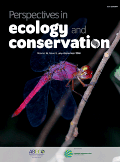
Perspectives in Ecology and Conservation
Innovative insights into conservation challenges and solutions.Perspectives in Ecology and Conservation, published by Elsevier Science Ltd, is a leading academic journal dedicated to advancing the fields of ecology, conservation, and environmental management. With a Q1 ranking in multiple categories, including Ecology, Management, Monitoring, Policy and Law, and Nature and Landscape Conservation, this journal boasts an impressive standing among its peers, making it essential reading for researchers and professionals. Since its inception in 2017 and running through 2024, it aims to provide innovative perspectives and critical analyses that enhance our understanding and practices in conservation science. The journal is accessible through open access options, facilitating broader dissemination of knowledge. Its commitment to addressing contemporary ecological challenges reinforces its importance in the academic community, promoting sustainable practices and informed policy-making in the face of urgent environmental issues.
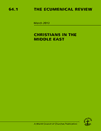
ECUMENICAL REVIEW
Connecting Scholars in the Realm of FaithECUMENICAL REVIEW is a respected academic journal dedicated to the field of Religious Studies, published by WILEY. Since its inception in 1948 and continuing through 2024, this journal has played a crucial role in fostering interdisciplinary dialogue and scholarly research on various facets of religion and spirituality. With an ISSN of 0013-0796 and E-ISSN 1758-6623, ECUMENICAL REVIEW currently holds a Q3 ranking in the 2023 category of Religious Studies, reflecting its significant contribution to the field. The journal is ranked #337 out of 644 within its category on Scopus, placing it in the 47th percentile—indicative of its relevance and quality. Although it does not offer open access, the journal remains a valuable resource for researchers, professionals, and students alike who seek to engage with contemporary discussions on ecumenical issues. As it continues to explore the intersections of faith, culture, and social justice, ECUMENICAL REVIEW stands as an important platform for enriching the academic landscape of Religious Studies.
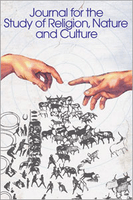
Journal for the Study of Religion Nature and Culture
Exploring the Interconnections of Belief, Environment, and SocietyJournal for the Study of Religion Nature and Culture, a prominent academic journal published by EQUINOX PUBLISHING LTD, offers an interdisciplinary platform for scholars exploring the intricate relationships between religion, nature, and culture. With a Q1 ranking in Cultural Studies and Religious Studies, this journal holds a significant position, reflecting its impact and scholarly contributions within its field. The journal’s comprehensive scope encompasses contemporary issues at the intersection of these domains, welcoming innovative research that stimulates dialogue among academics from diverse backgrounds. While it is not currently an Open Access journal, the ISSN: 1749-4907 ensures its availability in libraries and institutions worldwide, fostering knowledge dissemination and engagement. Located in the United Kingdom and pioneering in its field since 2013, Journal for the Study of Religion Nature and Culture invites researchers, professionals, and students to contribute to its mission of advancing understanding of the profound connections shaping our world today.

International Journal of Public Theology
Exploring the Nexus of Faith and SocietyInternational Journal of Public Theology, published by BRILL, stands at the intersection of faith, society, and academic inquiry. With an ISSN of 1872-5171 and an E-ISSN of 1569-7320, this journal is pivotal for scholars engaged in Religious Studies, Sociology, and Political Science. The journal boasts notable rankings in Scopus, being positioned at 167/644 in the field of Religious Studies, reflecting a 73rd percentile standing, while also contributing to the sociological discourse with a rank of 1006/1466 and a 31st percentile. As it converges through years from 2013 to 2024, it critically engages with contemporary issues at the nexus of public theology and societal dynamics, making it an essential resource for researchers, professionals, and students committed to exploring the role of faith in public life. For those eager to disseminate and access high-quality research, this journal offers a vital platform within the academic and theological discourse.

Theoretical Ecology
Advancing ecological insights through rigorous modeling.Theoretical Ecology, published by SPRINGER HEIDELBERG, is a premier journal in the field of ecological modeling and theory, exemplifying the intersection of rigorous quantitative analysis and ecological understanding. With its ISSN 1874-1738 and E-ISSN 1874-1746, this journal has been a valuable resource for researchers since its inception in 2008, with a commitment to publish cutting-edge research until 2024. The journal's 2023 category quartiles demonstrate its impact, ranking Q3 in Ecological Modeling and Q2 in Ecology, reflecting its significance within the academic community. Furthermore, its Scopus rankings position it among the top tier of environmental science journals, ranking #181/461 in Ecology and #21/41 in Ecological Modeling. While the journal does not offer open access, it is an essential publication for those looking to deepen their understanding of theoretical frameworks that drive ecological research and practice. By providing a platform for innovative theories and models, Theoretical Ecology plays a crucial role in shaping future ecological studies and informing policy decisions in environmental management.
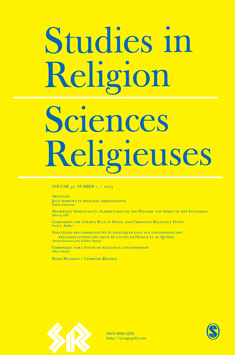
STUDIES IN RELIGION-SCIENCES RELIGIEUSES
Fostering Critical Dialogue in the Realm of ReligionSTUDIES IN RELIGION - SCIENCES RELIGIEUSES, published by SAGE Publications Ltd, serves as a premier platform for scholarly research in the field of Religious Studies, with an ISSN of 0008-4298 and an E-ISSN of 2042-0587. As a journal with a distinguished history dating back to 1971, it has established itself in the Q1 category of Religious Studies and ranks an impressive 173 out of 644 in Scopus, positioning itself in the 73rd percentile among its peers. The journal not only aims to disseminate innovative research that advances understanding of religious phenomena but also fosters critical dialogue among scholars, professionals, and students alike. Although it does not currently offer Open Access options, its rigorous peer-review process ensures that published articles meet the highest academic standards. Situated in the United States, the journal is committed to maintaining scholarly excellence and relevance in an ever-evolving field of study, making it an essential resource for anyone engaged in the academic exploration of religion.
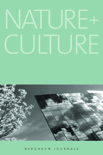
Nature + Culture
Exploring the Interplay of Environment and SocietyNature + Culture, published by BERGHAHN JOURNALS, focuses on the interdisciplinary exploration of cultural and environmental relationships, bridging the gap between the social sciences and ecological studies. With its ISSN 1558-6073 and E-ISSN 1558-5468, this journal has established itself as a key platform for scholars aiming to advance discussions in an era of rapid environmental change and cultural transformation. Operating from the United States, specifically at 20 Jay St, Suite 512, Brooklyn, NY 11201, it holds a respectable position within the academic community, evidenced by its Q3 ranking in Social Sciences (miscellaneous) for 2023 and its Scopus rank of #132 out of 275 in General Social Sciences. While currently not an Open Access journal, Nature + Culture provides vital insights that address the pressing issues of our time, making it an essential resource for researchers, professionals, and students committed to understanding the intersection of nature and human culture from 2008 through its converging years into 2024.
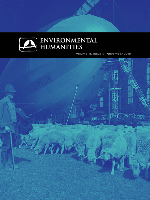
Environmental Humanities
Cultivating a Deep Understanding of Human-Environment InteractionsEnvironmental Humanities, published by DUKE UNIVERSITY PRESS, is a premier journal that has established itself as a leading platform for interdisciplinary scholarship at the intersection of the environment and the humanities. With its open access framework since 2012, the journal fosters widespread dissemination of critical research that integrates perspectives from Anthropology, Ecology, and the Social Sciences. Currently holding impressive Q1 rankings in both Anthropology and Social Sciences for 2023, along with notable Q2 standings in Environmental Science fields, this journal provides a vital forum for innovative explorations of how human culture shapes and is shaped by environmental challenges. Situated in the United States, the journal encourages authors and thinkers to contribute to ongoing discussions about sustainability, ethics, and the cultural dimensions of environmental issues, making it an essential resource for researchers, professionals, and students alike. With a commitment to high-quality scholarship, Environmental Humanities plays a crucial role in advancing knowledge and understanding in a rapidly evolving field.

Environmental Communication-A Journal of Nature and Culture
Transforming Perspectives through Environmental CommunicationEnvironmental Communication: A Journal of Nature and Culture, published by Routledge Journals, Taylor & Francis Ltd, is a leading interdisciplinary journal dedicated to the exploration of the dynamic relationships between environmental issues, communication practices, and cultural contexts. With ISSN 1752-4032 and E-ISSN 1752-4040, this journal plays a crucial role in advancing knowledge within the field, buoyed by its impressive Q1 rankings in both Environmental Science (Miscellaneous) and Management, Monitoring, Policy, and Law as of 2023. The journal engages with a broad audience, including researchers, professionals, and students, by providing a platform for critical discussions on how communication impacts environmental governance and cultural perceptions of nature. The journal's commitment to scholarly rigor ensures its significant impact, evidenced by its Scopus rankings—38th out of 219 in environmental science and 94th out of 399 in management, monitoring, policy, and law—placing it in the top percentiles of its categories. Although it does not offer open access at this moment, the range of topics covered from 2010 to 2024 promises to enrich the dialogue surrounding environmental advocacy, policy-making, and cultural narratives, making it an essential resource for anyone invested in environmental communication.